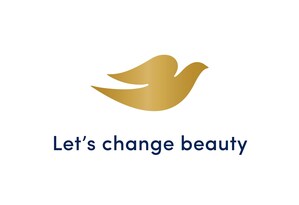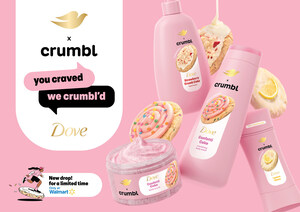A NEW STUDY FROM THE DOVE SELF-ESTEEM PROJECT FINDS 1 IN 2 GIRLS SAY IDEALIZED BEAUTY ADVICE ON SOCIAL MEDIA CAUSES LOW SELF-ESTEEM
The Dove Self-Esteem Project's #DetoxYourFeed Campaign Exposes the Insidious Nature of Toxic Beauty Advice in Teens' Feeds
ENGLEWOOD CLIFFS, N.J., April 27, 2022 /PRNewswire/ -- Teens in the US are spending increasing amounts of time on social media. NEW Dove Self-Esteem Project research proves this to be true. 2 in 3 girls in the US are spending more than an hour each day on social media, which is more than they are spending in person with friends. Beauty advice fills their feeds, but unfortunately, it is not all positive. In fact, 1 in 2 girls say idealized beauty content on social media causes low self-esteem.
The Dove Self-Esteem Project research concluded that the majority of girls realize that less time on social media and taking control of what they scroll, is part of the solution. In fact, 7 in 10 girls felt better after unfollowing idealized beauty content on social media.
For years, Dove has championed wider definitions of beauty and has taken action towards making social media a more positive place with campaigns like #SpeakBeautiful, #NoDigitalDistortion and Reverse Selfie/Selfie Talk.
Today, the Dove Self-Esteem Project is launching the #DetoxYourFeed campaign to empower teens to define their own beauty standards and choose their own influences by inviting them to unfollow anything that doesn't make them feel good about themselves. Through a series of films, educational content, and partnerships with inspiring voices, the campaign encourages necessary conversations between parents, caregivers and teens about the dangers of toxic beauty advice.
In a longform campaign film, Toxic Influence, moms and their teens engage in a dialogue around harmful beauty advice on social media. The film highlights dangerous topics like "fitspo," "thinspo" and the promotion of elective cosmetic procedures to young girls. Moms who participated were surprised to learn that this type of harmful beauty advice has become normalized for their daughters. They were inspired to have the important conversations around what their daughters are seeing in their feeds.
"We've identified a clear problem that is eroding the self-esteem of our girls and needs immediate attention and action. We created this #DetoxYourFeed campaign to not only raise awareness around the insidious nature of toxic beauty advice, but to also help parents navigate tough conversations and empower teens to unfollow content that makes them feel bad about themselves," says Leandro Barreto, Global Vice President of Dove. "While it may be a bit overwhelming at times, we hope it will contribute to important conversations that lead to a more positive experience for teens on social media."
80% of girls would like their parents to talk to them about how to manage idealized beauty posts, so the Dove Self-Esteem Project has developed academically-validated resources and tools to help parents navigate important conversations with their kids and empower teens to #DetoxYourFeed:
- "Detox Your Feed: The Parents Guide" – a three-minute educational film for parents, caregivers and mentors on facilitating conversations with young people about the harms of social media.
- "The Confidence Kit" – free Dove Self-Esteem Project workbook and tool featuring a new section, "Detox Your Feed: Talking to Your Kids About Toxic Social Media Advice."
Additional resources to change the way parents and teens think and talk about beauty will also be made available. The Dove Real Talk Parent workshop – a free, virtual, live-stream event and Q&A session being held on May 12th with cultural expert Jess Weiner and leading psychotherapist Nadia Addesi – will provide parents with the tools to fight toxic influence on teens' social media feeds.
Registered Social Worker & Psychotherapist, Nadia Addesi, who has used her expertise to foster digital self-esteem for her community on TikTok, says "This campaign is important as public discourse grows around the harmful effects social media can have on girls. It contextualizes the insidious nature of harmful beauty advice that's become normalized in teens' feeds. While it might feel harmless, given half of girls say social media causes low self-esteem, ongoing exposure has the potential to have a negative and lasting impact. "
The Dove Self-Esteem Project is the world's largest provider of body confidence education globally, reaching more than 82 million young people across 150 countries to-date through initiatives like the #DetoxYourFeed campaign. In the U.S alone, Dove reaches more than six million kids per year, through partnerships with Boys & Girls Clubs of America and education consultancy, Cairn Guidance. By 2030, Dove will have helped 250 million kids and teens boost their self-esteem through educational programming and no-cost resources.
To help spread the #DetoxYourFeed message, Dove is partnering with Gabrielle Union and Zaya Wade to remind everyone that the power to curate your feed and overall experience with social media is in your hands. "As a parent and someone who's felt the pressures from social media to look perfect, it's important to me that people realize what's on their teens' feeds and help them confidently navigate conversations about it.' says Gabrielle Union. Zaya Wade adds, "I want people to know they can prioritize themselves and set boundaries on social media, and that it can be a positive place if you unfollow content that doesn't make you feel good."
Dove believes no one should follow anyone into thinking they aren't beautiful and empowering teens to #DetoxYourFeed will help build the body confidence and self-esteem of a quarter billion girls by 2030. Go to Dove.com/Detoxify to watch Dove's NEW Toxic Influence film and learn how to #DetoxYourFeed. Together, we can change beauty.
Share your experience and help us change beauty by using the hashtag #DetoxYourFeed on Facebook, Twitter, Instagram and TikTok tagging @Dove and #DoveSelfEsteemProject.
ABOUT THE DOVE SELF-ESTEEM PROJECT
Dove has a long-standing commitment to creating a world where beauty is a source of confidence, not anxiety. The Dove Self-Esteem Project was established in 2004 to help the next generation develop a positive relationship with the way they look so they are not held back by appearance-related anxiety and can realize their full potential. Created in partnership with the Centre for Appearance Research at the University of West England – the world's largest research group focusing on the role of appearance and body image in people's lives – Dove Self-Esteem Project tools are academically validated and free to download. So far, The Dove Self-Esteem Project has reached more than 82 million young people across 150 countries, making it one of the largest providers of body confidence education globally. By 2030, we'll have helped 250 million through our no-cost academically validated tools.
NEW DOVE RESEARCH
Online survey conducted by Edelman DXI, a global, multidisciplinary research, analytics and data consultancy, in the USA between February and April 2022 respectively with 524 and 1,027 girls aged 10-17 as well as 1,501 and 1,027 mothers and parents.
ABOUT DOVE
Dove started its life in 1957 in the US, with the launch of the Beauty Bar, with its patented blend of mild cleansers and ¼ moisturizing cream. Dove's heritage is based on moisturization, and it is proof not promises that enabled Dove to grow from a Beauty Bar into one of the world's most beloved beauty brands.
Women have always been our inspiration and since the beginning, we have been wholly committed to providing superior care to all women and to championing real beauty in our advertising. Dove believes that beauty is for everyone. That beauty should be a source of confidence and not anxiety. Dove's mission is to inspire women everywhere to develop a positive relationship with the way they look and realize their personal potential for beauty.
For 30 years, Dove has been committed to broadening the narrow definition of beauty in the work they do. With the 'Dove Real Beauty Pledge,' Dove vows to:
- Portray women with honesty, diversity and respect. We feature women of different ages, sizes, ethnicities, hair color, type, and style.
- Portray women as they are in real life, with zero digital distortion and all images approved by the women they feature.
- Help young people build body confidence and self-esteem through the Dove Self-Esteem Project, the biggest provider of self-esteem education in the world.
ABOUT UNILEVER NORTH AMERICA
Unilever is one of the world's leading suppliers of Beauty & Personal Care, Home Care, and Foods & Refreshment products, with sales in over 190 countries and products used by 3.4 billion people every day. We have 148,000 employees and generated sales of €52.4 billion in 2021. Over half of our footprint is in developing and emerging markets. We have around 400 brands found in homes all over the world – including iconic brands like Dove, Knorr, Hellmann's, Magnum, Axe, Ben & Jerry's, Degree, Seventh Generation, St. Ives, Suave, TRESemmé, and Vaseline.
Our vision is to be the global leader in sustainable business and to demonstrate how our purpose-led, future-fit business model drives superior performance. We have a long tradition of being a progressive, responsible business. It goes back to the days of our founder William Lever, who launched the world's first purposeful brand, Sunlight Soap, more than 100 years ago, and it's at the heart of how we run our company today.
The Unilever Compass, our sustainable business strategy, is set out to help us deliver superior performance and drive sustainable and responsible growth, while:
- improving the health of the planet;
- improving people's health, confidence and wellbeing; and
- contributing to a fairer and more socially inclusive world.
While there is still more to do, in the past year we're proud to have achieved sector leadership in S&P's Dow Jones Sustainability Index, 'Triple A' status in CDP's Climate, Water and Forest benchmarks, and to be named as the top ranked company in the GlobeScan/SustainAbility Sustainability Leaders survey for the eleventh consecutive year.
For more information on Unilever U.S. and its brands visit: www.unileverusa.com
For more information on Unilever Canada and its brands visit: www.unilever.ca
Media Contact: Dana Paolucci [email protected]
SOURCE Dove

WANT YOUR COMPANY'S NEWS FEATURED ON PRNEWSWIRE.COM?
Newsrooms &
Influencers
Digital Media
Outlets
Journalists
Opted In







Share this article